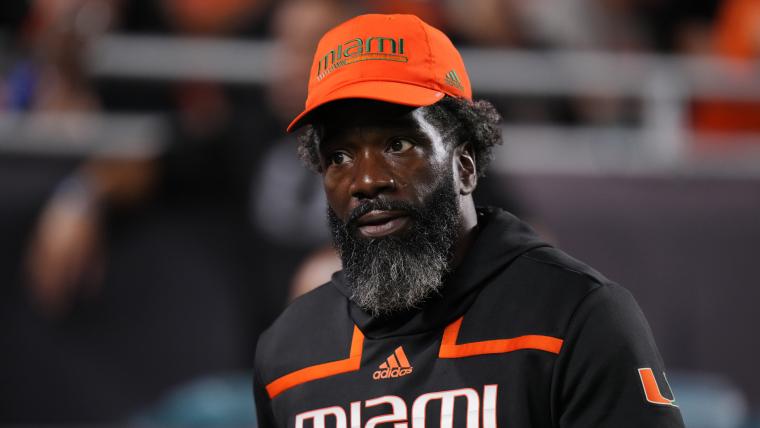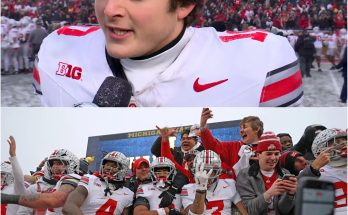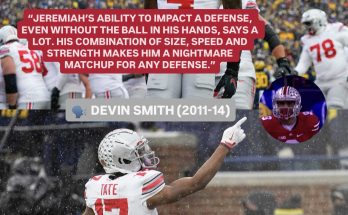NFL Hall of Famer Ed Reed, a Legend of the Miami Hurricanes, Takes on an Unexpected New Coaching Position
When the name Ed Reed is mentioned, football enthusiasts around the world immediately think of a hard-hitting safety with an unparalleled ability to read the game, intercept passes, and change the momentum of a match. As a cornerstone of the Baltimore Ravens’ defense and a standout collegiate player for the Miami Hurricanes, Reed cemented his legacy as one of the greatest defensive players in football history. Recently, however, Reed made headlines not for his exploits on the gridiron but for a surprising career move: taking on a new coaching position in a role few would have anticipated.
A Storied Career: From Miami to Canton
Ed Reed’s football journey began in St. Rose, Louisiana, where he showcased his athletic prowess at Destrehan High School. His talent earned him a scholarship to the University of Miami, where he became an integral part of the Hurricanes’ powerhouse football program. Reed played a pivotal role in Miami’s national championship-winning 2001 season, establishing himself as a leader both on and off the field.
During his collegiate career, Reed set school records for interceptions and interception return yards. His knack for making game-changing plays earned him All-American honors twice, and he left Miami as one of the most decorated players in the program’s history.
After college, Reed was drafted 24th overall by the Baltimore Ravens in the 2002 NFL Draft. Over the course of his illustrious 12-year NFL career, Reed achieved almost every accolade imaginable. A nine-time Pro Bowler, five-time First-Team All-Pro, and the 2004 NFL Defensive Player of the Year, Reed’s instinctive playmaking and leadership were instrumental in the Ravens’ Super Bowl XLVII victory. His 64 career interceptions rank seventh all-time in NFL history, and his 1,590 interception return yards remain an NFL record.
In 2019, Reed’s career achievements were immortalized when he was inducted into the Pro Football Hall of Fame. During his induction speech, Reed emphasized the importance of mentorship, leadership, and giving back—themes that would resonate in his post-playing career.
Transitioning to Coaching
Following his retirement from professional football, Reed’s passion for the game never waned. He transitioned into coaching and advisory roles, sharing his wealth of knowledge with younger generations. Reed’s first foray into coaching came with the Buffalo Bills in 2016, where he served as an assistant defensive backs coach under head coach Rex Ryan.
Though his time with the Bills was short-lived, Reed’s impact on the players was evident. His ability to break down complex defensive schemes and inspire confidence in his players made him a natural fit for the coaching world. However, Reed’s ambitions extended beyond traditional coaching roles. He returned to his alma mater, the University of Miami, in 2020 as the Chief of Staff for the football program. In this role, Reed acted as a mentor, advisor, and liaison between players, coaches, and university administrators, further solidifying his reputation as a leader and educator.
An Unexpected Opportunity
In December 2023, Ed Reed surprised the football world by accepting a new coaching position at an unexpected destination: Bethune-Cookman University, a historically Black college and university (HBCU) located in Daytona Beach, Florida. The move marks Reed’s first head coaching role and represents a significant shift in his career trajectory.
Bethune-Cookman’s football program, part of the Southwestern Athletic Conference (SWAC), has a storied history but has faced challenges in recent years. By bringing in a high-profile figure like Reed, the university aims to rejuvenate its football program, attract top-tier talent, and elevate its status on the national stage.
Reed’s appointment follows a growing trend of prominent former NFL players taking coaching roles at HBCUs. Deion Sanders’ transformative tenure at Jackson State University demonstrated how a high-profile coach could revitalize an HBCU football program, bringing increased visibility, funding, and competitive success. Reed’s arrival at Bethune-Cookman signals a similar commitment to leveraging his star power and football acumen to make a lasting impact.
Challenges and Opportunities
Taking the reins at Bethune-Cookman presents Reed with a unique set of challenges and opportunities. Unlike major Division I programs, HBCUs often operate with limited budgets and resources, making it difficult to compete with larger schools in recruiting and facilities. Reed’s ability to navigate these constraints while building a winning culture will be critical to his success.
However, Reed’s presence alone has already generated excitement among players, alumni, and fans. His Hall of Fame credentials and connections to the NFL provide a significant recruiting advantage, as young athletes aspire to learn from one of the game’s greatest defensive minds. Additionally, Reed’s leadership and mentorship skills make him uniquely qualified to inspire and develop student-athletes both on and off the field.
The Broader Impact of Reed’s Move
Ed Reed’s decision to coach at Bethune-Cookman carries implications beyond the football field. It highlights the growing recognition of HBCUs as vital contributors to the college sports landscape and underscores the importance of investing in these institutions. By choosing to lead a program at an HBCU, Reed is not only advancing his coaching career but also helping to elevate the profile of Bethune-Cookman and other HBCUs nationwide.
Reed’s move also aligns with broader efforts to address racial disparities in college sports. Historically, HBCUs have been underrepresented in media coverage and funding, despite their rich athletic traditions. By attracting high-profile coaches and fostering competitive programs, HBCUs can reclaim their place as incubators of athletic excellence.
What’s Next for Ed Reed and Bethune-Cookman?
As Reed prepares to lead the Wildcats, the football world will be watching closely. Success won’t come overnight, but Reed’s track record as a player and mentor suggests he’s up to the task. Key areas of focus for Reed will include:
- Recruiting: Leveraging his NFL connections and personal brand to attract talented players who might otherwise overlook Bethune-Cookman.
- Building a Winning Culture: Instilling discipline, work ethic, and a commitment to excellence among his players.
- Enhancing Visibility: Using his platform to bring national attention to Bethune-Cookman and advocate for greater investment in HBCU athletics.
- Player Development: Helping student-athletes maximize their potential on the field while preparing them for life after football.
Reed’s journey at Bethune-Cookman is just beginning, but the potential for transformative change is immense. His unique blend of experience, passion, and leadership could set a new standard for HBCU football programs and inspire future generations of coaches and players.
Conclusion
Ed Reed’s decision to take on a head coaching role at Bethune-Cookman University is both unexpected and inspiring. It reflects his unwavering commitment to mentorship, education, and giving back to the game that has given him so much. As a Hall of Famer, Reed could have pursued any number of opportunities in the football world, but his choice to lead an HBCU program speaks volumes about his character and vision.
In the coming years, Reed’s impact at Bethune-Cookman will be measured not only in wins and losses but also in the lives he touches and the legacy he builds. For now, one thing is certain: Ed Reed’s journey as a coach is just as compelling as his journey as a player, and the football world is better for it.



